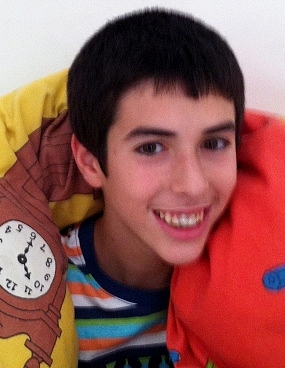
Autism has two faces. The best known one is the Rain Man stereotype, the savant. Dr. Temple Grandin, a livestock engineer with autism who has written movingly about her life, fits into this category. She is extraordinarily successful in her work, but she has a limited social life, since she finds it difficult to read social cues. People who call themselves Aspies and blog about how autism is not a disability but simply a different way of being are another example of what it's like at the higher-functioning end of the autistic spectrum. 
By now, you probably know a bit about those who are called low-functioning autistics as well. They tend to be non-verbal or to speak very little. They seem to be in their own world. Many are not toilet-trained and are prone to self-injury and frequent and often violent tantrums. They will never be able to live independently, nor will they be in a position to blog about how their condition is a blessing.
Neither description fits my 16-year-old son, Danny. He began speaking at an average age, about 10 months, and now talks incessantly. What he says doesn't always make sense, but he clearly speaks out of a great need to make contact. For example, at a Purim party a couple of months ago, he went up to a teen dressed like Gene Simmons of Kiss and said, "There's something I really need to ask you." He smiled a big smile -- I'm not objective, but I think he has a very winning grin -- and the boy looked at him expectantly. But Danny didn't know how to get out the words he needed to say, and so simply stood there.
Welcome to the confusing world of medium-functioning autism. I think everyone on the planet can be described as medium-functioning, meaning we are all high-functioning in certain areas, but low-functioning in others. So what does it mean when it is applied to people with autism? A great deal, and nothing.
Danny is bilingual, since he grew up hearing two languages, and can speak and read both English and Hebrew. His memory and navigational skills are phenomenal, but I wouldn't say he's a savant, just gifted in these areas. He is strongly attached to people in his life -- his family of course, but also babysitters, neighbors, therapists he's had, storekeepers, parking lot attendants and, well, you get the idea. If I tell him in the morning that a friend he loves will visit in the evening, he is happy all day. I joke that he was absent from Autism Training the day they taught that autistic people aren't interested in others. When I based a character on him in my novel, If I Could Tell You, some readers expressed surprise that a child diagnosed with autism could be so well related. Given that a lack of social skills is considered one of the core deficits of autism, it is surprising.
Still, in spite of his language skills and attachment to people, Danny is not high-functioning. Why not? Well, he is incredibly hyper and it is hard to describe how difficult it is for him to sit down and concentrate. Take the most severely ADHD kid you've ever seen and multiply by 100. And no, it isn't a matter of giving him Ritalin or similar drugs. They don't help and actually make him worse in some ways. He still has tantrums during which he can lash out physically and pinch people, including me and his teachers.
While most people reading this are probably thinking, "What an odd collections of symptoms," some parents will say, "That's my kid, too." The practical problem we parents of the medium-functioning face is that educational frameworks and therapies tend to be designed with either high- or low-functioning autistic kids in mind. Outside of the educational system, I have found individual therapists who have been enormously helpful to Danny. Inside it, there has been virtually nothing for him.
There really isn't a typical medium-functioning child, which is what makes finding the right classroom so hard. I know of kids who only speak to ask for food, never make eye contact and loathe being around people, but they are considered medium-functioning because they will sit and perform whatever task is put in front of them. Virtually non-verbal kids with artistic or musical gifts are also often called medium-functioning.
There are no easy solutions for anyone diagnosed with autism, and the most important thing parents can do is just to keep going, no matter how frustrating it gets. When it comes to Danny, I feel privileged at how social and affectionate he is. He's so tuned in to me that he'll say, "You're sad, Mom," when I'm down. And he has an uncanny ability to say the right thing at the right moment. Once, when his brother was terribly upset that snow was predicted, but hadn't fallen, Danny sang out: "It's been a hard day's life."
It doesn't get much better than moments like that. Still, I hope that Danny's hard day's life -- and the lives of all the other kids diagnosed with autism -- does get easier and more manageable.